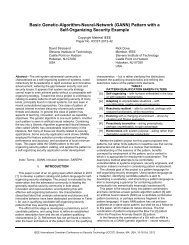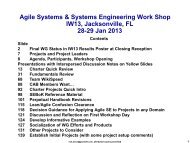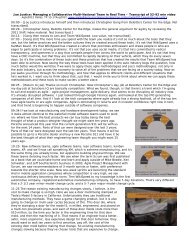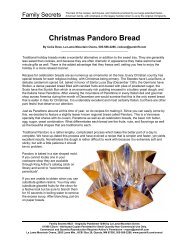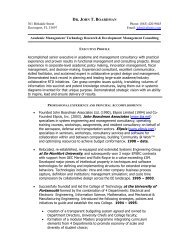23 - Paradigm Shift International
23 - Paradigm Shift International
23 - Paradigm Shift International
Create successful ePaper yourself
Turn your PDF publications into a flip-book with our unique Google optimized e-Paper software.
sand responses, we see the allocation of more training<br />
time, hiring smarter people, and even elimination of<br />
automation in favor of more people.<br />
How about dealing with the real problem: tell your<br />
equipment vendors that within five years you will not<br />
purchase any equipment unless it can be maintained with<br />
less than 15 minutes of training and operated with less<br />
than 5 minutes of training - then give them some examples<br />
of how this might be achieved - and tell them that each<br />
purchase hereafter will evaluate the training requirements<br />
as part of the selection process.<br />
Does your industry care about this issue now? For some<br />
the answer is "No". But if you're in autos you better look<br />
at these numbers very seriously - Japan has already<br />
backed away from automation because it can't keep its<br />
machines running, and US manufacturers are simply<br />
shirking their training requirements and screaming louder<br />
at equipment vendors for a situation they have created<br />
(buy low and pay for what you get forever).<br />
Why do you think those new plants don't come on<br />
stream on schedule? The equipment doesn't work and<br />
nobody knows why or how to fix it! Lots of cussing and<br />
spit and bailing wire later we see a de-rated plant that is<br />
proudly proclaimed as late but wonderful; and then we<br />
hear "We learned from the experience." Just exactly what<br />
is it we learned? We'll never use those vendors or that<br />
design again? We'll assign different people in a different<br />
approach to the next plant conversion? All pushing at<br />
pimples and symptoms - nobody's looking at the disease.<br />
Equipment should be self diagnosing and able to<br />
foresee problems before they occur - not because this is<br />
they way it ought to be in some ideal world - but because<br />
this is the way some folks are actually already doing it. It<br />
can be done. Vendor experts should be able to place a<br />
phone call to the equipment and diagnose it with awesome<br />
expertise at hand. When anything other than module swap<br />
is required, a local untrained person should be guided<br />
through rare fix-it activity while online visually and<br />
audibly with vendor expertise and vast knowledge bases.<br />
But that's not the subject of this column.<br />
What are the key competitive change proficiency issues<br />
in your industry? They are not likely to be the same as the<br />
ones in another industry. How do you stack up against<br />
today's issues in your industry? If magic equipment<br />
maintenance or instant new-equipment mastery is not<br />
accomplished by anyone else in your industry, or if<br />
production equipment failure is not a significant factor in<br />
costs and productivity, then don't worry about it. But if<br />
either of these is true and you are not actively embarked<br />
upon a path toward graduate wizardry, then we're back to<br />
where the sun don't shine.<br />
The industry sector modeling projects (call us for<br />
participation) starting this fall and next year will:<br />
1) Identify sector-critical business practices.<br />
2) Identify key change issues in each practice.<br />
3) Identify defining capabilities of maturity stages.<br />
4) Build a comprehensive Change Proficiency Maturity<br />
Model for the 10-or-so critical business practices of<br />
current focus in the industry sector.<br />
Each sector project will have a modeling team of<br />
qualified participants from 5-7 companies in an industry -<br />
to provide breadth without becoming unwieldy. With<br />
group-ware tools and a structured analysis approach, one<br />
week in full-team workshop can knock off item 1 and<br />
scope out item 2. Then individual one-week workshops at<br />
each of the participant's operating sites examines three to<br />
five high competency practices, and collectively knocks<br />
off item 2 while scoping out item 3. A final full-team oneweek<br />
workshop deals with the findings to knock off item 3<br />
and build a complete model of all practices. Sensitivity<br />
about proprietary capabilities is mitigated by using neutral<br />
facilitator-analysts to guide the individual participantspecific<br />
workshops - and to filter the data for the final fullteam<br />
workshop for form rather than content.<br />
So maybe in your sector the model will show that<br />
equipment up-time is a problem, but nobody is focused on<br />
it strategically as yet. This puts it in the category of future<br />
focus as opposed to current. And that means it is an<br />
opportunity for innovative leadership and immediate<br />
disproportionate advantage.<br />
Creation<br />
Augmentation<br />
Migration<br />
Modification<br />
Correction<br />
Variation<br />
Expansion<br />
Reconfiguration<br />
Simple Proforma Example: Key Human-Relationship Change-Issues in Machining Industry<br />
Proactive Change Proficiency Issues<br />
Obtaining top quality people; and creating a sense of team, ownership, and responsibility.<br />
Improving personnel skills.<br />
Workforce diversity; top management succession.<br />
Gaining new skills; guarding against insularity.<br />
Reactive Change Proficiency Issues<br />
Correcting mismatches between people and their tasks.<br />
Filling critical slots when a key employee is absent.<br />
Finding more high-quality machinists; handling surge requirements.<br />
Reassigning tasks and responsibilities to meet special needs.<br />
<strong>Paradigm</strong> <strong>Shift</strong> <strong>International</strong> is an enterprise research and guidance firm focused on Agile operations and competitiveness. Its current<br />
focus is on customized industry- and corporate-specific Change Proficiency Maturity Models. Inquire at 505-586-1536 for participation.






